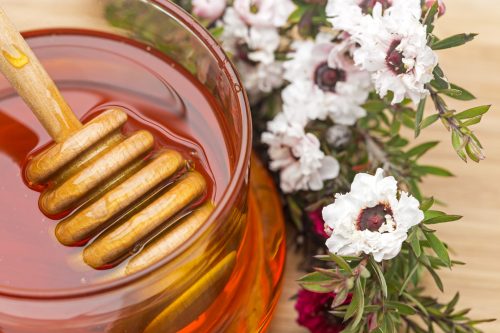
Q. “I’ve heard that manuka honey is better for me than other varieties of honey, but don’t really understand why that is. What are the medicinal benefits of manuka honey, and will I get these benefits if I just replace my normal honey with manuka honey?”
Penny
A. Our resident nutritionist, Rose Carr, talked to Professor Molan at the Honey Research Unit of Waikato University to find out about manuka honey.
The Honey Research Unit has been studying honey, especially manuka honey, since 1995. They discovered that manuka honey, in addition to the hydrogen peroxide found in all honeys, contains a unique antibacterial component that is beneficial for skin infections and wound healing. This is known as Unique Manuka Factor or UMF.
The Unit’s ongoing research has found that honey with UMF is much more potent than most other honeys when it comes to antibacterial action. Active manuka honey with UMF is about twice as effective as other honey against Escherichia coli and Staphylococcus aureus, the most common causes of infected wounds. Manuka honey with a rating of UMF10 or higher is used around the world as a wound dressing in hospitals, where it is highly effective in treating wounds that haven’t responded to standard treatment. It can also work in cases where patients have developed resistance to the usual antibiotics.
UMF honey may also be effective in treating the bacteria which causes most stomach ulcers, Helicobacter pylori, but there have been few trials and evidence is limited at this stage.
It seems we still have a lot to learn about the benefits of honey. Recent animal studies by the researchers at Waikato University compared the effects of a diet including low-GI, high-antioxidant content honey versus a low-GI, sugar-free diet and a high-GI diet including sugar. In one study the honey diet appeared to positively influence anxiety-like behaviour and in another it seemed the honey improved spatial learning recognition and memory in older age. These effects may be due to the antioxidant content of the honey and its lower GI compared with other sugars, or some other component not yet identified.
As for how to include manuka honey in your diet, you can replace your normal honey with manuka honey but it is quite expensive. I’d suggest using your normal honey for cooking and sweetening drinks, and use the manuka honey where you can really enjoy its flavour: on sandwiches and toast, or drizzled over porridge or over roasted fruit for dessert. Remember honey is sweeter than sugar, so when using it as a sweetener replace half the sugar with honey as your starting point.
www.healthyfood.com










